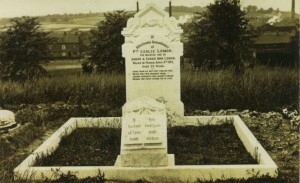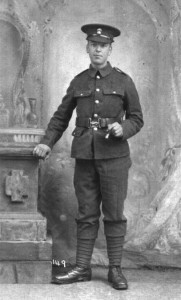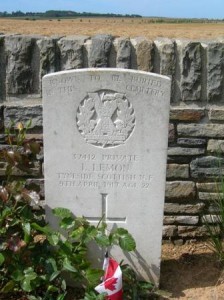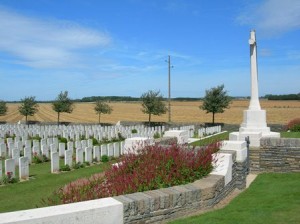Private 37412 & 4/3449 20th Bn. (Tyneside Scottish) Northumberland Fusiliers.
Died Monday 9th April 1917 (Age 22)
At Rest: Roclincourt Valley Cemetery, Pas de Calais, France
Memorial Ref.: Sp. Mem. A.2.
Leslie was born Westwood in 1895, the son of James & Sarah Lemon of New Westwood. The 1891 Census indicates that the family originated from Derby (the three eldest Lemon children having been born in Derby). The younger children were born at Codnor, Derbyshire, indicating the family also lived in Codnor at one time. There were 10 occupants of the Lemon home at the time of the census. These were: - head of household – James Lemon age 47 (occupation – Stationery Engine Driver) and his wife Sarah age 36; son Edward age 20 (occupation – Forge Worker); son Charles age 14 (occupation – General Labourer); son William aged 12; daughter Sarah age 10; son Arthur age 9; and another daughter, also named Sarah age 7 years. Leslie Lemon and his brother Percy Lemon were yet to be born. Also in residence were: - George Lemon, nephew, age 18 (occupation – Iron Puddler) and a Charles Mathew who was perhaps a boarder.
In 1906 Leslie was a scholar at Ironville & Codnor Park Church of England School. His fellow classmates included Harry Heald, George Wilmott and Joseph Barker who, like Leslie, lost their lives during World War One. His school mate George Wilmott had a narrow escape in 1905 when he fell into the nearby Codnor Park Reservoir and was saved from drowning by Leslie’s brother, Percy.
Leslie became an employee of James Oakes Pipeworks, Pye Hill. An article in the Free Press of 1917 also tells us that Leslie was “an earnest and consistent Sunday School Teacher connected with St Mary’s Church, Westwood and he was held in very high esteem by all who knew him.” Leslie enlisted at Derby on 11th March 1916 and less than 4 months later, on the 9th July 1916 was posted to France. Less than one year later, on Monday 9th April 1917, Leslie was killed in action, aged 22 years. He was ‘runner’ to Captain MFL Selby, Officer Commanding 20th Northumberland Fusiliers who wrote to the Lemon family informing them of his death. In his letter to Leslie’s brother, Percy Lemon, Captain Selby states the following: -
“It is with great sorrow that I have to inform you that your brother was killed in action on the 9th April last and as he acted as my runner I can assure you that he is missed very greatly by me. As I have been in the push ever since I have not had time to write before. He was beloved by all the men and was a perfect soldier. He was killed instantaneously and could not have suffered any pain. I hope you will accept my deepest sympathy and convey same to all who loved him. Trusting God will be merciful to you all and comfort you in your great loss. Yours very sincerely M.F.L. Selby Captain, O.C. 20th Northumberland Fusiliers.” ( Note: As far as we are aware, Captain Selby survived).
Leslie was awarded the British War and Victory Medals.
Private Leslie Lemon is commemorated at the Roclincourt Valley Cemetery, Pas de Calais, France. The 9th April 1917 was the first day of the Battles of Arras and heavy losses were sustained. The Roclincourt Valley Cemetery was begun after the 9th April by the units which fought on that day and was used until the following August.
Leslie’s gravestone states “KNOWN TO BE BURIED IN THIS CEMETERY” and is, therefore, the ‘Special Memorial’ to Leslie - his exact burial place is unidentified within the cemetery.
Leslie is also remembered on the family grave at St Mary’s Church, Westwood (as is his brother, Charles Alfred Lemon, who died on 14th February 1925, aged 47 years).
Leslie was one of two brothers who joined up. His brother Percy Lemon was promoted ‘from the ranks’ attaining the rank of Lieutenant. Percy was to survive the war and is listed on the Jacksdale War Memorial as having served. An H Lemon is also listed as having served but

at this stage we have no conclusive proof to indicate that he was a relative.
Northumberland Fusiliers World War One Casualties - 17,005 (Source: R. Capewell ‘Discovering Military Badges’).














